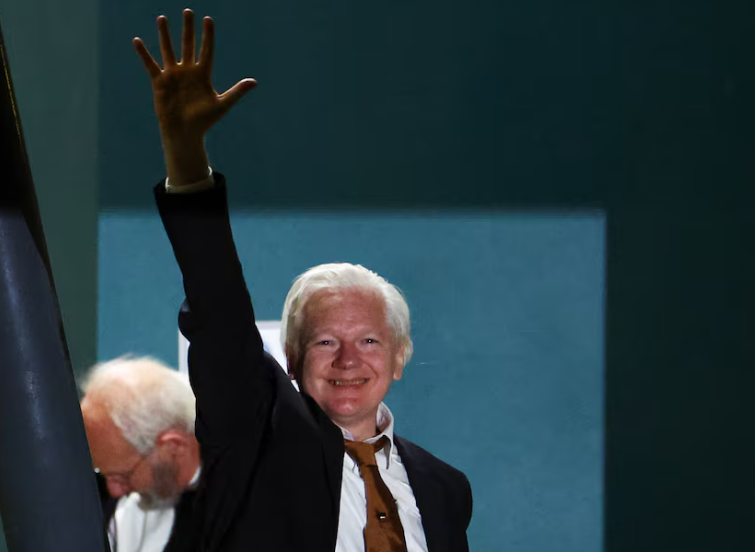WikiLeaks founder Julian Assange landed in Australia to an ecstatic welcome on Wednesday after pleading guilty to violating U.S. espionage law. This deal set him free from a 14-year legal battle. Assange disembarked from a private jet at Canberra airport just after 7:30 p.m. (0930 GMT). He waved to waiting media and cheering supporters before passionately kissing his wife, Stella, and lifting her off the ground. He embraced his father before entering the terminal building with his legal team.
Since his release, Assange has not spoken publicly and did not attend a Wikileaks press conference at a hotel in Canberra. Stella Assange explained that it was too soon to say what her husband would do next. “Julian needs time to recover, to get used to freedom,” she said. “I want Julian to have that space to rediscover that freedom.” She also expressed her belief that her husband would one day receive a pardon.
Australia’s Prime Minister Anthony Albanese, who had lobbied for years to free Assange, spoke to him by phone after his plane landed. “I had a very warm discussion with him this evening. He was very generous in his praise of the Australian government’s efforts,” Albanese told an earlier press conference. “The Australian government stands up for Australian citizens; that’s what we do.”
Assange’s arrival ended a saga in which he spent more than five years in a British high-security jail and seven years in asylum at the Ecuadorean embassy in London. He had been battling extradition to Sweden on sexual assault allegations and to the U.S., where he faced 18 criminal charges. These charges stemmed from WikiLeaks’ release in 2010 of hundreds of thousands of classified U.S. military documents on Washington’s wars in Afghanistan and Iraq, one of the largest breaches of secret information in U.S. history.
During a three-hour hearing held in the U.S. territory of Saipan, Assange pleaded guilty to one criminal count of conspiring to obtain and disclose classified national defense documents. He explained that he had believed the U.S. Constitution’s First Amendment, which protects free speech, shielded his activities. “Working as a journalist, I encouraged my source to provide information that was said to be classified in order to publish that information,” he told the court. “I believed the First Amendment protected that activity, but I accept that it was a violation of the espionage statute.”
Chief U.S. District Judge Ramona V. Manglona accepted his guilty plea, noting that the U.S. government indicated no personal victim resulted from Assange’s actions. She wished Assange, who turns 53 on July 3, an early happy birthday as she released him due to time already served in a British jail.
While the U.S. government viewed Assange as reckless for putting its agents at risk of harm by publishing their names, his supporters hailed him as a hero for promoting free speech and exposing war crimes. “We firmly believe that Mr. Assange never should have been charged under the Espionage Act and engaged in an exercise that journalists engage in every day,” his U.S. lawyer, Barry Pollack, told reporters outside the court. He assured that WikiLeaks’ work would continue.
Assange’s British and Australian lawyer, Jennifer Robinson, thanked the Australian government for securing Assange’s release. His father, John Shipton, expressed his relief. “That Julian can come home to Australia and see his family regularly and do the ordinary things of life is a treasure,” Shipton said in Canberra, where he was waiting for his son. “The beauty of the ordinary is the essence of life.”
Assange agreed to plead guilty to a single criminal count, according to filings in the U.S. District Court for the Northern Mariana Islands. Prosecutors chose the U.S. territory in the western Pacific due to his opposition to traveling to the mainland U.S. and for its proximity to Australia.
Politicians in Australia who had campaigned for his release raised concern about the guilty plea on U.S. soil, stating that he was a journalist convicted for doing his job. “That is a really alarming precedent. It is the sort of thing we’d expect in an authoritarian or totalitarian country,” said Andrew Wilkie, an independent lawmaker who led a parliamentary group advocating for Assange.
Assange spent more than five years in one of Britain’s harshest prisons and seven years holed up in the Ecuadorean embassy in London as he fought extradition. While at the embassy, he had two sons with Stella, who had been one of his lawyers. They married in 2022 at Belmarsh prison in London.

